Grow and grow and grow
For a long time H had thought it was just cartilage. Anomalous cartilage. He’d slide a finger over it, rubbing and poking, pushing and sometimes squeezing. Occasionally, he’d take a short metal hairslide from his mother’s make-up bag, hook the curved end around the small white bump and then push down hard on the surrounding skin, gently salivating at the thought of it bursting. But it never did.
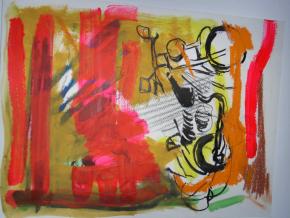
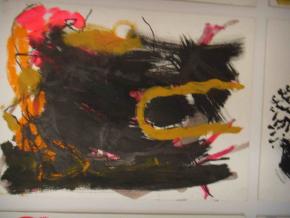
It was frustrating because he couldn’t see it. He could only feel it. He didn’t even know it was there until someone else pointed it out. His ex-wife, in fact. They were driving up the M11 towards Leicester to see her parents. H was at the wheel and she was gazing at the side of his face when she noticed, in the lowest curve of his concha, a yellowy bulge.
“You’ve got a huge spot in your ear,” she crabbed. “Christ, you’re disgusting. Don’t you ever wash?”
Reaching over and pulling on the lobe, she tried to take a closer look — she wanted a poke — but he snatched his head away, flicking his wrist at her and cursing. The car swerved, and a few weeks later they separated.
H moved back to his mother’s house in Liverpool. She lived in a pale pink bungalow close to the Mersey. He hated it there — he’d fled the area fifteen years earlier, aged twenty-two, when he made his first attempt as a war reporter, in Afghanistan. He had taken some superb shots. He was not so much brave as lacking in fear, which he learned was very different, and was driven by a desire to be close to death.
“It makes me feel alive,” he used to tell his editor, who said she’d heard it all before.
He travelled across the country with the Mujahideen and an occasional Russian, and his pictures appeared in newspapers around the world. He’d spend hours scripting the captions, and if the papers changed them he’d write to the picture editor to complain. H’s obsession with providing the absolute explanation of the context of his photographs became compulsive. Sometimes he’d write several paragraphs detailing the personal histories of each person — or body — in the picture. He’d also include information about how he’d been feeling when he took the picture, whether he was scared, happy, jealous or guilty. Increasingly, he’d write about what he did afterwards: how close he went to the bodies, which bits he touched and how they made him feel. He liked to include observations of the sounds he heard at the time — screams, moans, gasps of breath — and the smell of carbonised flesh, excretions and burning vehicles. Sometimes he could taste Lady Grey tea in the air, his mother’s violet scent, or the chlorine in the swimming pool in France where his father used to take the family on holiday in the early eighties. 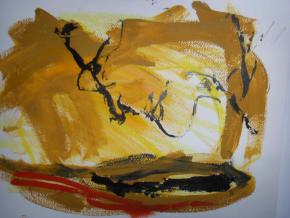
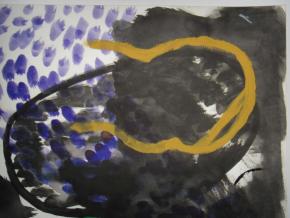 Sometimes H wrote about how much the moments of war made him laugh, especially whenever his friend, Sulaiman, a local Afghan reporter, ran and hid from Saudi rockets; or the time the soldiers they were accompanying caught a young cat and hanged it from the lowest branch of a small tree to try and frighten a team of Swiss aid workers. H photographed the animal swinging by its neck and sent it, with a long caption, to his mother. When Sulaiman was killed, H returned home.
Sometimes H wrote about how much the moments of war made him laugh, especially whenever his friend, Sulaiman, a local Afghan reporter, ran and hid from Saudi rockets; or the time the soldiers they were accompanying caught a young cat and hanged it from the lowest branch of a small tree to try and frighten a team of Swiss aid workers. H photographed the animal swinging by its neck and sent it, with a long caption, to his mother. When Sulaiman was killed, H returned home.
The hanged cat is now framed inside a rectangle of plastic pink flowers in his mother’s lounge. A golden Labrador figurine sits lovingly beneath it, pink-tongued and possibly panting. H is sitting on the olive green settee, running his fingers up and down the velveteen cushions remembering Sulaiman praying under a wooden table. His mother is by his side, pouring tea.
“I’ve bought your favourite, dear,” she says slicing into a long slim roll of yellow sponge filled with red jam. “Just like when you were at school.”
H eats the whole cake, slice after slice, sluicing it down with weak tea.
“And what about your ear, dear? Have you done anything about that?”
H remembers the lump, and begins stroking it, pushing and poking it. It’s much bigger now — certainly too big to squeeze into the loop of a hairgrip. Six months after he’d moved back to Liverpool, it began to grow and grow and grow, until the outer ear was completely blocked. And then, one Wednesday, it burst. The stretched skin pinged and peeled back like the fortune fish that curl in the palm, and red and yellow goo oozed out. When the fluids were exhausted, a thick white spongy substance started erupting and spitting violently from the top of the lump.
H has developed terrible headaches. Sometimes the excretions are so heavy, he can do no better than tip his head sideways to allow the white fleshy nodules to slide and plop steadily into one of his mother’s old Christmas-pudding bowls. When she remembers, she tips the contents into the toilet, giving the bowl a quick rinse before returning it.
On dry days, H covers his ear with a thick square of cotton wool and a criss-cross of pink plaster, and takes a short walk along the Mersey. He stares out across the grey skies, blinking back his tears, trying to remember the smell of burned flesh and the sound of a Saudi rocket. He closes his eyes and tries to hear Sulaiman screaming with fear. He pushes himself to the limit trying to recall how to take a picture, how to focus, how to press the shutter down. But there is nothing. Nothing left inside at all. When he cannot take the confrontation with emptiness any more, he turns around and steps slowly home, glaring into the endless gift shops with window displays of silver heart-shaped balloons filled with helium. Sometimes the old queer in the antiques shop waves, and asks him in for a cup of tea. Sometimes H remembers to buy his mother a candle from Candle Corner. She likes them scented.
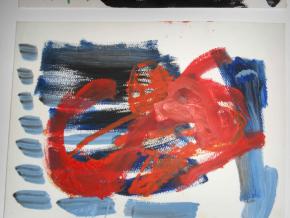
images by René Tavares